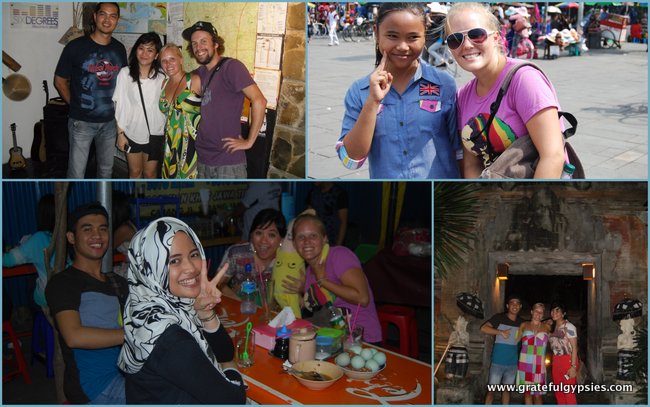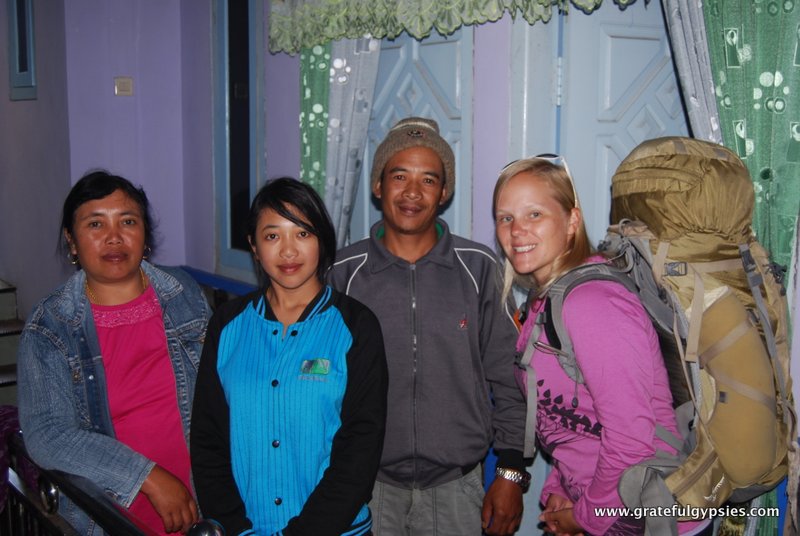Introductions and Greetings in Indonesian Posted by sasha on Nov 17, 2016 in Uncategorized
When you’re just starting out learning a language, one of the most important things to do is get comfortable making introductions and greeting people. For those learning Indonesian in the country, you’ll have plenty of chances to do this. People in Indonesia are for the most part quite friendly and talkative. If you’re a bule, many are very interested to chat with and learn about you. This post will help you get started by introducing some common greetings and useful words/phrases for making introductions.
Greetings
For native English speakers, you’ll be happy to hear that it’s very common in Indonesia to simply greet people with a simple “Hello,” especially if you’re a foreigner. To greet people in Indonesia the local way, you’ll want to get used to saying one word very often…
Selamat
This word is used in many common Indonesian greetings and everyday phrases. Take a look:
-
selamat pagi = good morning
-
selamat siang = good afternoon (early)
-
selamat sore = good afternoon (late)
-
selamat malam = good evening
-
selamat tidur = good night
-
selamat datang = welcome
-
selamat tinggal = goodbye (said to person staying)
-
selamat jalan = goodbye (said to person leaving)
Don’t fret too much about when to use pagi, siang, sore, and malam. I was corrected countless times while living in Indonesia and never quite figured out when to use each. Generally speaking, pagi is used early in the morning, before 10. Siang is around 10-2 while sore is from 2-6ish. After the sun goes down, you can use malam. Another very common Indonesian greeting is…
Apa kabar?
This translates directly as “What news?”, but it’s used to mean “How are you?” in Indonesian. Here are a few different ways to respond to this greeting:
-
baik-baik saja = fine (formal)
-
baik-baik = fine
-
baik = good
-
lumayan = alright
-
biasa saja = so-so
-
kurang baik = not so good
-
tidak baik = not good
For the most part, people stick to the positive in Indonesia. When greeting people, 9 times out of 10 you’ll hear some version of “baik-baik” as an answer. Even if you’re having a bad day, keep your head up, smile, and respond with a cheery “baik.”
Introductions
When making introductions in Indonesia, it’s important to be formal and show respect. This is especially true when meeting people who are around the same age or older. Get used to hearing and saying these words very often:
-
Bapak = Sir/Mr.
-
Ibu = Ma’am/Ms./Mrs.
You may recognize these words from our lesson on family vocabulary. That’s because bapak also means “father” and ibu means “mother.” Quite often, these will be shortened to just “pak” and “bu.” When being introduced to people, you’ll usually hear one of these words followed by their name. Unlike English, it’s not certain that the family name will be used when combined with these honorifics. For example, I called two of my teachers “Pak Made” and “Bu Ningsi” – using their first names.
In some parts of Indonesia, there are different words you can use for people who are of the same age or younger than you:
-
Mas = young man
-
Mbok = young woman
When I was studying Indonesian in Yogyakarta, my teachers referred to me as “Mas Sasha.” None of my teachers or friends in Bali used this, though. If you’re not sure about someone’s age, it’s best to err on the side of caution and be more polite.
As for introducing yourself, we covered that a while back in a short video. Study it and copy down the questions and you’ll be able to practice:
After mastering these common greetings and introduction phrases, you’ll be able to get talking to people you meet. Once again, I stress how friendly Indonesian people are – they’ll be very patient with your basic skills and be happy to hear you speaking any of their language. This is a great motivating factor to keep studying and one of the reasons that studying Indonesian can be quite easy if you have the chance to travel there.

Build vocabulary, practice pronunciation, and more with Transparent Language Online. Available anytime, anywhere, on any device.
About the Author: sasha
Sasha is an English teacher, writer, photographer, and videographer from the great state of Michigan. Upon graduating from Michigan State University, he moved to China and spent 5+ years living, working, studying, and traveling there. He also studied Indonesian Language & Culture in Bali for a year. He and his wife run the travel blog Grateful Gypsies, and they're currently trying the digital nomad lifestyle across Latin America.





